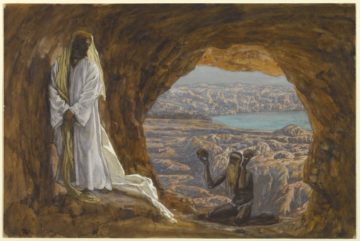As we anticipate a new liturgical season, Franciscan Friar Fr. Paul Gallagher offers us Gospel Reflections on our journey of Lent. The content is edited by Franciscan Sister of Christian Charity Sister Anne Marie Lom and Joe Thiel. The excerpts from the Sunday readings are prepared by Joe Thiel. To read or download the complete pdf with excerpts for your prayer, please click here: Franciscan Gospel Reflection March 6 2022 Excerpts are from the Lectionary for Mass for Use in the Dioceses of the United States of America, second typical edition © 2001, 1998, 1997, 1986, 1970 Confraternity of Christian Doctrine, Inc., Washington, DC. Used with permission. All rights reserved. No portion of this text may be reproduced by any means without permission in writing from the copyright owner. Photo: The Temptation of Christ by the Devil, Felix Joseph Barrias, 1860. (public domain, Philibrook Museum of Art); Brooklyn_Museum_-_Jesus_Tempted_in_the_Wilderness_(Jésus_tenté_dans_le_désert)_-_James_Tissot_-_overall.jpg (768×514) (wikimedia.org)
Luke 4:1-13
 Filled with the Holy Spirit, Jesus returned from the Jordan and was led by the Spirit into the desert for forty days, to be tempted by the devil. He ate nothing during those days, and when they were over he was hungry. The devil said to him, “If you are the Son of God, command this stone to become bread.” Jesus answered him, “It is written, ‘One does not live by bread alone.'”
Filled with the Holy Spirit, Jesus returned from the Jordan and was led by the Spirit into the desert for forty days, to be tempted by the devil. He ate nothing during those days, and when they were over he was hungry. The devil said to him, “If you are the Son of God, command this stone to become bread.” Jesus answered him, “It is written, ‘One does not live by bread alone.'”
Then he took him up and showed him all the kingdoms of the world in a single instant. The devil said to him, “I shall give to you all this power and glory; for it has been handed over to me, and I may give it to whomever I wish. All this will be yours, if you worship me.” Jesus said to him in reply, “It is written: ‘You shall worship the Lord, your God, and him alone shall you serve.'”
Then he led him to Jerusalem, made him stand on the parapet of the temple, and said to him, “If you are the Son of God, throw yourself down from here, for it is written: ‘He will command his angels concerning you, to guard you,’ and: ‘With their hands they will support you, lest you dash your foot against a stone.'” Jesus said to him in reply, “It also says, ‘You shall not put the Lord, your God, to the test.'” When the devil had finished every temptation, he departed from him for a time.
Background:
Luke ends his description of the Baptism of Jesus with a voice of God proclaiming: “You are my beloved Son; with you I am well pleased” (Luke 3:22). At the time of Jesus, people believed that such a statement was heard throughout the spirit world. They understood that numerous evil spirits roamed about creating havoc on human beings. The first verses of the book of Job contain a dialogue between Satan and God that illustrates the thinking of the ancient peoples regarding the role of evil spirits in their world:
“One day, when the sons of God came to present themselves before the LORD, Satan also came among them. And the LORD said to Satan, “Whence do you come?” Then Satan answered the LORD and said, “From roaming the earth and patrolling it.” And the LORD said to Satan, “Have you noticed my servant Job, and that there is no one on earth like him, blameless and upright, fearing God and avoiding evil?” But Satan answered the LORD and said, “Is it for nothing that Job is God-fearing? Have you not surrounded him and his family and all that he has with your protection? You have blessed the work of his hands, and his livestock are spread over the land. But now put forth your hand and touch anything that he has, and surely he will blaspheme you to your face.” (Job 1:6-11)
Some appreciation for how ancient people understood their world, and the role that evil spirits played in their daily life, helps to understand why Jesus would be led by the spirit into the desert where he would be tested by the devil. People would expect that the evil spirits would respond to God’s statement of confidence and delight in Jesus with a challenge to validate its truth, and if true, to test Jesus to see if they might trick him into acting in a way that brings upon him shame. (Think of the way the devil tricks Adam and Even in the garden to eat of the forbidden fruit.)
The temptations themselves can be seen as an attempt to get Jesus to use power–personal, social and religious–in a way that would act contrary to his solidarity with being fully human. Rejecting the use of power aligns Jesus with being fully human and vulnerable. Luke is setting the stage for the rest of Jesus’ ministry through the choices Jesus makes. Unlike the Jewish people who went into the wilderness and repeatedly complained and abandoned their relationship with YHWH, Jesus remains faithful. He is the one more powerful that John spoke of. “I am baptizing you with water, but one mightier than I is coming. I am not worthy to loosen the thongs of his sandals” (Luke 3:16). Luke ends his account of Jesus’ temptation with the suggestion that the tempter left Jesus but will look for another opportunity to return. That opportunity will come at his passion.
 Reflection Questions:
Reflection Questions:
- What have been the most difficult times of hardship and struggle which you have endured? What was your temptation in those periods? Looking back, what did you learn about yourself and God’s relationship with you?
- Who are your heroes for how they have dealt with hardships in their life?
- How do you express your solidarity with people who are experiencing hardship and struggle in their life today?
- Why does the first verse of this gospel text remind us that it was the Spirit that led Jesus into the desert? What is that saying to you?
- What does it mean for you that Jesus was tempted?
- What does it mean for you that Jesus did not yield to those temptations?
- Why do you think we begin every Lent with a gospel reading that focuses on Jesus being tempted?
- Can you take some time now to talk with God about the difficult periods in your life, your demeanor as we enter another Lenten season, or some other concern that arose from this gospel text?


